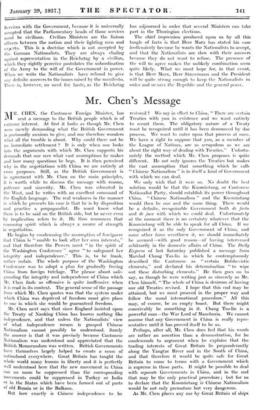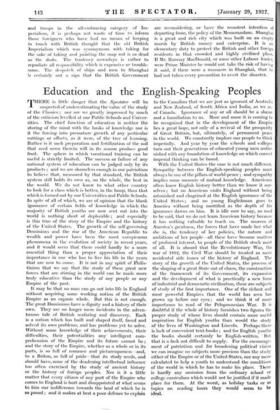Mr. Chen's Message
MR. CHEN, the Cantonese Foreign Minister, has sent a message to the British people which is of extreme interest. At first it looks as though Mr. Chen were merely demanding what the British Government is profoundly anxious to give, and one therefore wonders what all the trouble is about. Why could there not be tm immediate settlement ? It is only when one looks into the arguments with which Mr. Chen supports his demands that one sees what vast assumptions he makes and how many questions he begs. It is then perceived why in the negotiations with China we are entirely at cross purposes. Still, as the British Government is in agreement with Mr. Chen on the main principles, it is worth while to discuss the message with reason, patience and sincerity. Mr. Chen was educated in the West, and he writes with an excellent command of the English language. The real weakness in the manner in which he presents his case is that he is by disposition and practice a propagandist. He must know what there is to be said on the British side, but he never even by implication refers to it. He thus renounces that reasoning spirit which is always a source of strength in negotiation.
He begins by condemning the assumption of foreigners that China is " unable to look after her own interests," and that therefore the Powers must " in the spirit of the Washington Conference " agree " to safeguard her integrity and independence." This is, to be frank, rather unfair. The whole purpose of the Washington Conference was to adopt a plan for gradually freeing China from foreign tutelage. The phrase about safe- guarding the integrity and independence of China which Mr. Chen finds so offensive is quite inoffensive when it is read in its context. The general sense of the passage from which Mr. Chen quotes was that the system under which China was deprived of freedom must give place to one in which she would be guaranteed freedom.
Mr: Chen next says that since England insisted upon the Treaty of Nanking China has known nothing like independence, and that unless the Nationalists' view of what - independence means is grasped Chinese Nationalism cannot possibly be understood. Surely the answer is that it was precisely because Cantonese Nationalism was understood and appreciated that the British Memorandum was written. British Governments have themselves largely helped to create a sense of nationhood everywhere. Great Britain has taught the whole world many lessons in liberty and it is perfectly well understood here that the new movement in China can no more be suppressed than the corresponding movements could be suppressed in Turkey or India or in ,the States which have been formed out of parts of old Russia or in the Balkans.
But how exactly is Chinese independence to be restored ? We say in effect to China, " There arc certain Treaties with you in existence and we want entirely to recast them. The obligatory nature of a Treaty must be recognized until it has been denounced by due process. We want to enter upon that process at once.
We have a right to suppose that you, as a member of the League of Nations, arc as scrupulous as we arc about the right way of dealing with Treaties." Unfortu- nately the method which Mr. Chen proposes is quite different. He not only ignores the Treaties but makes the vast assumption that something which he calls " Chinese Nationalism " is in itself a kind of Government with which we can deal.
• We only wish that it were so. No doubt the best solution would be that the Kuomintang, or Cantonese Nationalist Party, should establish its power throughout China. " Chinese Nationalism " and the Kuomintang would then be one and the same thing. There would be a definite, recognizable Government both de facto and de jure with which we could deal. Unfortunately at the moment there is no certainty whatever that the Kuomintang will be able to speak for all China. If we recognized it as the only Government of China, and some other force overthrew it, we should immediately be accused—with good reason—of having intervened arbitrarily in the domestic affairs of China. The Daily Express of last Saturday published a message from Marshal Chang Tso-tin in which he contemptuously described the Cantonese as " certain Bolshevistic elements," and declared his determination " to wipe out these disturbing elements." He then goes on to say, as though he were writing just as sincerely as Mr. Chen himself, " The whole of China is desirous of having our old Treaties revised. I hope that this end may be attained, but we must proceed in the proper way and follow the usual international procedure." All this may, of course, be an empty boast. But there might conceivably be something in it. Chang Tso-lin is a powerful man—the War Lord of Manchuria. We cannot assume that any Government in China is really repre- sentative until it has proved itself to be so.
Perhaps, after all, Mr. Chen does feel that his words are rather an assertion than a demonstration, for he condescends to argument when he explains that the trading interests of Great Britain lie preponderantly along the Yangtze River and in the South of China, and that therefore it would be quite safe for Great Britain to come to terms with a Government which is supreme in those parts. It might be possible to deal with separate Governments in China, and in the end that may be the only practical procedure ; but for us to declare that the Kuomintang is Chinese Nationalism would be not only premature but very dangerous.
As Mr. Chen places any use by Great Britain of ships and troops in the all-embracing category of Im- perialism, it is perhaps not waste of time to inform those foreigners who have had no means of keeping in touch with British thought that the old British Imperialism which was synonymous with taking for the sake of taking and painting the map red is as dead as the dodo. The tendency nowadays is rather to repudiate all responsibility which is expensive or trouble- some. The despatch of ships and men to Shanghai is certainly not a sign that the British Government are reconsidering, or have the remotest intention of departing from, the policy of the Memorandum. Shanghai is a great and rich city which was built on an empty marsh by British money and enterprise. It is an elementary duty to protect the British and other foreign residents in that crowded and highly civilized place. If Mr. Ramsay MacDonald, or some other Labour leader, were Prime Minister he would not take the risk of having it said, if there were a massacre in Shanghai, that he had not taken every precaution to avert the disaster.







































 Previous page
Previous page